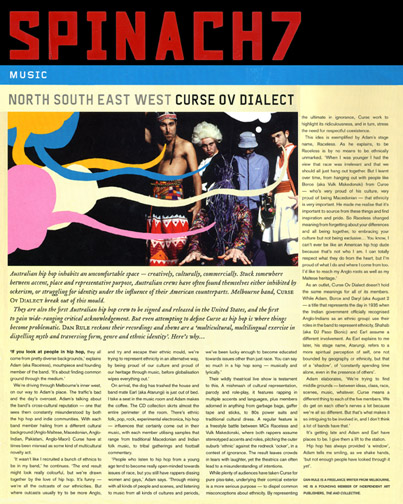
NORTH, SOUTH, EAST, WEST
Australian hip hop inhabits an uncomfortable space - creatively, culturally, commercially. Stuck somewhere between accent, place and representative purpose, Australian crews have often found themselves either inhibited by ockerism, or struggling for identity under the influence of their American counterparts. Melbourne band, CURSE OV DIALECT break out of this mould.
They are also the first Australian hip hop crew to be signed and released in the United States, and the first to gain wide-ranging critical acknowledgement. But even attempting to define Curse as hip hop is where things become problematic. DAN RULE reckons their recordings and shows are a 'multicultural, multilingual exercise in dispelling myth and traversing form, genre and ethnic identity'. Here's why:
'If you look at people in hip hop, they all come from pretty diverse backgrounds,' explains Adam (aka Raceless), mouthpiece and founding member of the band. "It's about finding common ground through the medium.'
We're driving through Melbourne's inner west, on our way to Adam's place. The traffic's bad and the day's overcast. Adam's talking about the band's cross-cultural reputation - one that sees them constantly misunderstood by both the hip hop and indie communities. With each band member hailing from a different cultural background (Anglo-Maltese, Macedonian, Anglo-Indian, Pakistani, Anglo-Maori) Curse have at times been misread as some kind of multicultural novelty act.
- "It wasn't like I recruited a bunch of ethnics to be in my band,' he continues. 'The end result might look really colorful, but we're drawn together by the love of hip hop. It's funny - we're all outcasts of our ethnicities. But where outcasts usually try to be more Anglo and try to escape their ethnic mould, we're trying to represent ethnicity in an alternative way, by being proud of our culture and proud of our heritage through music, before globalization wipes everything out.'
On arrival, the dog has trashed the house and band mate Earl (aka Atarungi) is just out of bed. I take a seat in the music room and Adam makes the coffee. The CD collection skirts almost the entire perimeter of the room. There's ethnic folk, pop, rock, experimental electronica, hip hop - influences that certainly come out in their music, with each member utilizing samples that range from traditional Macedonian and Indian folk music, to tribal gatherings and football commentary.
'People who listen to hip hop from a young age tend to become really open-minded towards issues of race, but you still have rappers dissing woman and gays,' Adam says. 'Through mixing with all kinds of people and scenes, and listening to music from all kinds of cultures and periods, we've been lucky enough to become educated towards issues other than just race. You can say so much in a hip hop song - musically and lyrically.'
Their wildly theatrical live show is testament to this. A mishmash of cultural representation, parody and role-play, it features rapping in multiple accents and languages, plus members adorned in anything from garbage bags, gaffer tape and sticks, to 80s power suits and traditional cultural dress. A regular feature is a freestyle battle between MCs Raceless and Vulk Makedonski, where both rappers assume stereotyped accents and roles, pitching the outer suburb 'ethnic' against the redneck 'ocker', in a contest of ignorance. The result leaves the crowds in tears with laughter, yet the theatrics can often lead to misunderstanding of intentions.
While plenty of audiences have taken Curse for pure piss-take, underlying their comical exterior is a more serious purpose - to dispel common misconceptions about ethnicity. By representing the ultimate in ignorance, Curse work to highlight its ridiculousness, and in turn, stress the need for respectful coexistence.
This idea is exemplified by Adam's stage name, Raceless. As he explains, to be Raceless is by no means to be ethnically unmarked. 'When I was younger I had the view that race was irrelevant and that we should all just hang out together. But I learnt over time, from hanging out with people like Borce (aka Vulk Makedonski) from Curse - who's proud of his culture, very proud of being Macedonian - that ethnicity is very important. He made me realize that it's important to source from these things and find inspiration and pride. So Raceless changed meaning from forgetting about your differences and all being together, to embracing your culture but not being exclusiveÉ You know, I can't ever be like an American hip hop dude because that's not who I am. I can totally respect what they do from the heart, but I'm proud of what I do and where I come from too. I'd like to reach my Anglo roots as well as my Maltese heritage.'
As and outlet, Curse Ov Dialect doesn't hold the same meanings for all it's members. While Adam, Borce and Daryl (aka August 2 - a title that represents the day in 1935 when the Indian government officially recognized Anglo-Indians as an ethnic group) use their roles in the band to represent ethnicity, Shahab (aka DJ Paso Bionic) and Earl assume a different involvement. As Earl explains to me later, his stage name, Atarungi, refers to a more spiritual perception of self, one not bounded by geography or ethnicity, but that of a 'shadow', of 'constantly spending time alone, even in the presence of others'.
Adam elaborates, 'We're trying to find middle grounds - between ideas, class, race, scenes, music, whatever. Curse means a different thing to each of the five members. We do get on each other's nerves a lot because we're all so different. But that's what makes it so intriguing to be involved in, and I don't think a lot of bands have that.'
It's getting late and Adam and Earl have places to be. I give them a lift to the station.
Hip hop has always provided 'a window', Adam tells me smiling, as we shake hands, 'but not enough people have looked through it yet'.
DAN RULE